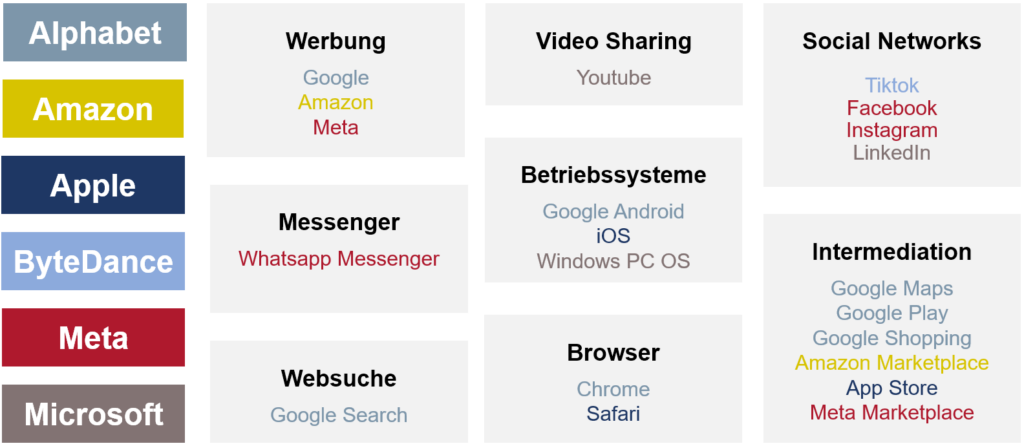Shortly after the new obligations of the Digital Markets Act (DMA) came into effect for six gatekeeper companies on 7 March 2024, the European Commission sent a strong signal for fair competition in the digital space and its own willingness to act: It has initiated no fewer than five proceedings against tech giants Apple, Alphabet, and Meta on 25 March 2024. The Brussels authority suspects that all three corporations might have violated DMA obligations, threatening penalties of up to ten percent of global annual turnover.
Alphabet and Apple are at the centre of investigations as their AppStore rules are suspected of unfairly preventing app developers from directing users to offers outside of their app stores. Alphabet is also being investigated for allegedly favouring its own services such as Google Shopping and Google Hotels in Google Search results. Apple is additionally facing accusations of impeding the installation of alternative default apps by third-party providers. Meta’s new “pay or consent” model will be examined to determine whether it provides a sufficient alternative for users who do not consent to Meta’s aggregation of their personal data. The European Commission aims to conclude these proceedings within twelve months, which would mark a significant acceleration compared to previous antitrust cases.
Finally, the Commission announces that it is already looking into further potential infringements. Amazon is under suspicion of illicitly favouring its own products over third-party offerings on the Amazon Marketplace. In addition, Apple’s new rules for alternative app stores and app installations via the web (sideloading) are under closer scrutiny. If the concerns are substantiated, formal proceedings could also be opened in this respect.
Background
In addition to Apple, Alphabet, and Meta, Amazon, Microsoft, and ByteDance (the provider of TikTok) are also designated addressees of the DMA. A total of 22 services from these companies are subject to special requirements which are designed to protect competition and market participants from abuse of structural superiority in addition to traditional antitrust instruments.

The DMA obligations are designed to prevent behaviours that have historically hindered competition and structurally disadvantaged competitors of gatekeepers. These include:
- Self-preferencing: Gatekeepers are prohibited from favouring their own services or products on their platforms.
- Interoperability: Gatekeepers’ competitors must have the opportunity to offer compatible products or services.
- Data access: Companies must be able to access the data they and their customers generate on the platform. As advertisers, they must also have access to data that enables them to assess advertising measures independently.
- Exclusivity: Companies must be able to direct end customers to their offers outside the platform and conclude contracts there. End customers must have the option to install software and apps from third-party providers on operating systems and devices.
The European Commission is assisted in the enforcement of the DMA in Germany by the Federal Cartel Office. The Federal Cartel Office can independently investigate potential breaches of the DMA and also subject companies with outstanding cross-market significance for competition to intensified national abuse supervision (Section 19a ARC). The Federal Cartel Office has already done this for the companies Meta, Apple, Amazon, and Alphabet. A corresponding procedure against Microsoft is currently ongoing.
The DMA provides a legal framework for all participants in digital markets to defend themselves against overpowering platforms that control access to their digital services and thus access to end customers. This can be done through submissions to the European Commission or the Federal Cartel Office, but also through civil litigation (private enforcement). Violations of the DMA are unlawful, corresponding provisions of the gatekeepers are invalid, and may give rise to claims for damages (Section 33a ARC), in particular for the replacement of profits lost over time as a result of the obstruction. Decisions of the European Commission on infringements of the DMA that have become final are also binding on German courts in damage compensation proceedings (Section 33b ARC), so that in subsequent damage compensation proceedings, the claimants burden of proof may be limited to causality and amount of damages.
Raue supports companies that are exposed to the superior market power of gatekeepers , from the legal assessment of anti-competitive practices and reliable documentation to the development of a cost-conscious and goal-oriented strategy to enforce our clients’ interest. Our clients can rely on our extensive experience in engaging with European competition authorities, our expertise in antitrust proceedings and cartel damage compensation processes, and an interdisciplinary and well-coordinated team of lawyers.
(26 March 2024)
